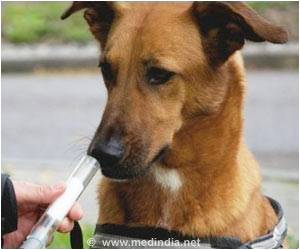- Cancer is one of the leading causes of death worldwide, and early diagnosis is key for successful treatment
- A recent animal study has shown that ants can smell cancer from the urine of cancerous mice in about 10 minutes
- Ants could be a cheaper and more accessible alternative to expensive and invasive screening methods
Ants act as olfactory bio-detectors of tumour in patient-derived xenograft mice
Go to source). Cancerous tumors produce unique types of molecules known as volatile organic compounds, which frequently appear in bodily fluids such as sweat and urine, as well as in breath vapour. Ants can sniff out those compounds in urine. The insects could be used one day as a less expensive, noninvasive detection method for cancer, the study authors say.
The lead author of the study named Baptiste Piqueret, an ethologist at Sorbonne Paris North University, already knew that ants could detect the volatile organic compounds coming from cancer cells. He previously discovered that he could train the ant species Formica fusca to differentiate between cancer cells and healthy cells grown in culture. Now he’s taken the research one step forward by making use of actual tumors (2✔ ✔Trusted Source
Ants detect cancer cells through volatile organic compounds
Go to source).
Training Ants How to Smell Cancer
The researchers started by transplanting human breast cancer tumors into mice and letting them grow using a technique called xenografting. Then they collected urine from both healthy mice and ones with tumors. By placing a drop of sugar water in front of the urine from animals with cancer, the researchers trained the ants to associate the smell of tumors with a reward. When the team removed the sugar water, the insects lingered around the urine of cancerous mice for about 20 percent longer than that of healthy mice because they were looking for a sweet treat.The Time Ants Took to Sniff out Cancer
It only took three training rounds, around 10 minutes total, to lock in the ants’ smell association. That’s significantly faster than training cancer-detecting dogs, which can take around six months. The authors were not expecting to see it that fast (3✔ ✔Trusted SourceOlfactory detection of cancer by trained sniffer dogs: A systematic review of the literature
Go to source).
Globally, cancer is responsible for around one in six deaths, making it a leading cause of mortality (4). Early detection is an imperative factor for successful treatment. Current diagnostic methods like colonoscopy or magnetic resonance imaging can be invasive or expensive.
Future of Cancer Testing Using Ants
Although the prospect of an ant-powered early-detection tool is exciting, researchers emphasize that the study is only in the beginning stage. The research is still far from any kind of clinical application. Compared to a highly controlled laboratory environment with mice as subjects, real-life patients will introduce many variables-including age, sex, and diet that could affect results. The tumors detected in the new study were proportionally large for mice (4✔ ✔Trusted SourceCancer
Go to source).
Next, the researchers will investigate how small a tumor can be before it goes undetected, and they will scale up the study by using urine from humans with particular cancers.
References:
- Ants act as olfactory bio-detectors of tumour in patient-derived xenograft mice - (https://www.biorxiv.org/content/10.1101/2022.05.16.492058v1.full)
- Ants detect cancer cells through volatile organic compounds - (https://pubmed.ncbi.nlm.nih.gov/35281730/)
- Olfactory detection of cancer by trained sniffer dogs: A systematic review of the literature - (https://air.unimi.it/bitstream/2434/487093/8/Pirrone%20et%20al.%202017_Olfactory.pdf)
- Cancer - (https://www.who.int/health-topics/cancer)
Source-Medindia















